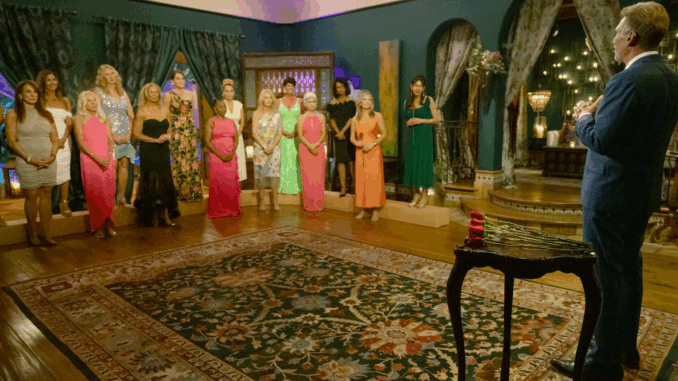
A Different Kind of Production for a Different Kind of Love Story
When ABC announced The Golden Bachelor, many viewers assumed it would be a typical Bachelor production—glamorous dates, confessionals, and tear-filled exits. But behind the scenes, producers faced a unique challenge: creating an environment that respected the needs, rhythms, and vulnerabilities of contestants in their 60s and 70s.
What emerged was not just a show—it was an entirely rethought production model, carefully calibrated for a cast of older adults navigating romance in front of a camera. And according to several insiders and contestants, that approach made all the difference.
Early Call Times, But Earlier Bedtimes
Reality TV is known for grueling filming schedules—late-night interviews, emotionally intense dates, and endless hours of waiting in full makeup. But The Golden Bachelor was different from the start.
Producers shifted most filming to daylight hours. One crew member, speaking anonymously, said: “We kept things tight. No 2 a.m. rose ceremonies. Everything wrapped by 9 p.m. at the latest. These folks aren’t 25-year-olds trying to become influencers. They value their sleep.”
Contestants reportedly appreciated the change. Faith Martin joked in a post-show interview, “The only drama I want at midnight is which flavor of tea I’m drinking.”
Health, Comfort, and Dignity: A New Set of Priorities
Behind the glamour of cocktail dresses and beach dates, producers worked closely with medical advisors and wellness teams. All contestants received thorough physical evaluations before filming began, and health support was available 24/7 on set.
Accommodations were also made in housing. Unlike younger seasons where women bunk together in rooms filled with bunk beds, the Golden Bachelor mansion was restructured with comfort in mind. Rooms were quieter, more private, and accessible.
“We didn’t want anyone tripping on stilettos at 3 a.m.,” said a crew member with a laugh.
These changes weren’t just about logistics—they reflected a deeper respect for the cast. As one producer noted, “You don’t put 70-year-olds in a pressure cooker and expect magic. You build a space where they can feel safe enough to be vulnerable.”
Conversations, Not Just Soundbites

Perhaps the biggest shift wasn’t logistical, but editorial. Previous seasons of The Bachelor often relied on fast edits and dramatic music to create tension. But with older contestants, the drama was quieter, deeper—and far more compelling.
Faith Martin and Gerry Turner’s emotional conversations about losing spouses couldn’t be rushed. Susan Noles’ reflections on motherhood and second chances needed space to breathe. Editors intentionally gave these moments room, cutting fewer interruptions and letting silence work.
“There was a reverence to it,” said a senior editor. “These weren’t just reality TV ‘moments.’ These were real-life reckonings—about mortality, forgiveness, hope.”
The audience noticed. Online reactions praised the show’s emotional sincerity. Many fans said they cried more during The Golden Bachelor than any other season, not because of betrayal or scandal—but because the emotions felt lived-in and real.
Wardrobe for Women Who Know What Works
Gone were the glittery cut-out dresses of past seasons. Instead, The Golden Bachelor leaned into classic style—draped fabrics, flattering silhouettes, and color palettes that celebrated maturity over flash.
Wardrobe stylists reportedly collaborated closely with the women. “They weren’t dressing for anyone but themselves,” said one style assistant. “And that was refreshing.”
Contestants like Leslie Fhima brought their own distinct flair—modern yet comfortable. April Kirkwood leaned into boho elegance, while Joan Vassos, though on screen briefly, left a lasting impression with timeless grace.
As one viewer put it, “These women redefined what it means to dress your age—and look incredible doing it.”
The Emotional Toll: High Stakes, Deeper Stories
While many contestants described filming as a joy, several admitted it wasn’t always easy. Being away from grandchildren, managing grief triggers, or confronting long-buried insecurities made the experience more intense than they expected.
Theresa Nist later shared in interviews that moments of self-doubt surfaced—questions about whether she deserved love again, whether she could trust so publicly. Susan Noles spoke candidly about the emotional labor of supporting fellow contestants through tears and heartbreak.
But those same struggles are what made the season unforgettable. Every laugh, every dance, every tear felt hard-won—and worth it.
Crew Reactions: Changed by the Experience
Interestingly, it wasn’t just the audience or contestants who were transformed. Several crew members—many in their 30s and 40s—shared that working on The Golden Bachelor reshaped their view of aging and relationships.
“It made me call my mom more,” one production assistant said. “And it made me think about how I want to grow old—with passion, purpose, and maybe a little bit of mischief.”
Producers also noted that the season fostered an unusually respectful atmosphere. “There wasn’t the ego you sometimes get from younger casts. These folks were grounded. They came for real connection. And they taught us how to listen better.”
What the Industry Can Learn from The Golden Bachelor
The show’s success wasn’t just a fluke—it was proof that television can evolve. When treated with care and integrity, even a long-running franchise like The Bachelor can reinvent itself.
The Golden Bachelor reminded the entertainment industry that older adults aren’t just a demographic—they are complex, compelling individuals with stories that matter. And when production respects that, the result is not just good TV—it’s meaningful storytelling.
Conclusion: A Production Worth Remembering
Behind the roses and romance, The Golden Bachelor succeeded because it dared to slow down, listen, and treat its cast with dignity. For a genre often accused of exploiting emotion for ratings, it offered something radical: respect.
In the end, that’s what made the show not just entertaining, but human. And it’s a lesson that producers—and viewers—won’t soon forget.